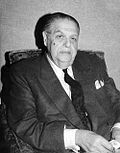| ||||||||||||||||
All 454 seats in the People's Assembly 228 seats needed for a majority | ||||||||||||||||
|---|---|---|---|---|---|---|---|---|---|---|---|---|---|---|---|---|
| ||||||||||||||||
| ||||||||||||||||
 |
|---|
|
| Constitution (history) |
| Administrative divisions |
| Political parties (former) |
Parliamentary elections were held in Egypt on 29 November 1995, with a second round for 168 seats on 6 December. [1] The result was a victory for the ruling National Democratic Party (NDP), which won 318 seats. Following the election, 99 of the 112 independents also joined the NDP. [1] Voter turnout was reported to be 47.99%. [1]
In the lead-up to the election, the Hosni Mubarak regime arrested over 1,000 Muslim Brotherhood activists. [2] 25 people were killed during the election campaign. [2]
The elections were characterized by widespread irregularities. [2] International election monitors were not allowed to monitor the elections. [2]


